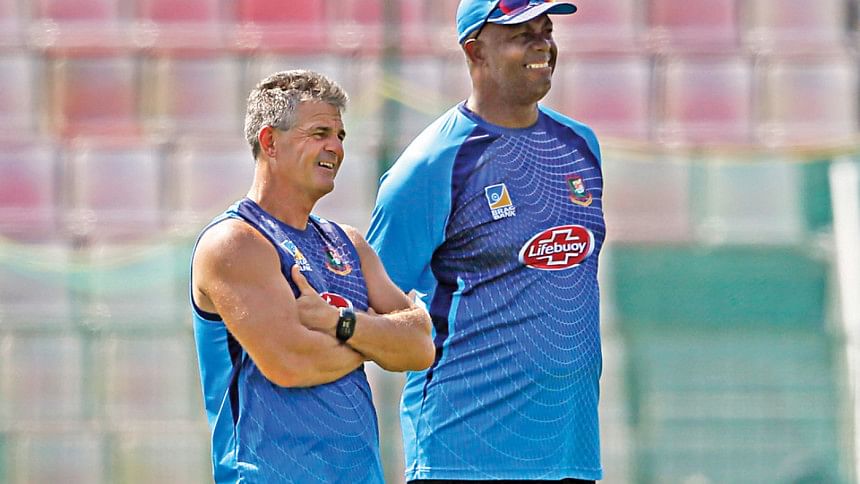The illusion of taking action

In the aftermath of an ultimately disappointing World Cup campaign which saw Bangladesh finish eighth in the 10-team table, the Bangladesh Cricket Board (BCB) announced on Monday that they would be parting ways with coach Steve Rhodes even though the Englishman's contract was till the 2020 World Twenty20. No official reason was offered, reviving old questions about the board's processes when selecting and ejecting coaches. That, and the treatment meted out to legendary bowling coach Courtney Walsh, who learned of his contract not being renewed through media leaks before BCB made the decision official yesterday, may well mean that high-profile names will not be lining up to fill the vacancy.
By the time Rhodes came on as coach at the start of the tour of West Indies in June last year, the presence of the five senior cricketers and the experience accrued over the Chandika Hathurusingha years had seen an evolution in the Bangladesh head coach's role.
The decision to informally institute Bangladesh's Big Five -- skipper Mashrafe Bin Mortaza, vice-captain Shakib Al Hasan, Tamim Iqbal, Mushfiqur Rahim and Mahmudullah Riyad -- as team leaders was taken when, after the premature resignation of Hathurusingha in October 2017, BCB president Nazmul Hassan had said that the seniors could look after the team while they were looking for Hathurusingha's replacement. In the interim -- seven months passed between Hathurusingha's premature exit and Rhodes's appointment -- the coach's role was filled in a stopgap capacity by Walsh and BCB director and former captain Khaled Mahmud.
Even after Rhodes's appointment, the hybrid management style persisted, and it was evident in press conferences where the coach often said that there was not much he had to do to manage the seniors -- hinting that it was more of a partnership than a coach-player relationship. Yet, it was Rhodes who paid the price for Bangladesh's poor World Cup.
Having taken the job on June 7, 2018, the highlight of Rhodes's tenure was Bangladesh's maiden multi-team ODI trophy win in Ireland in May this year and the nadir was his first assignment -- when Bangladesh were bundled out for 43 on way to being whitewashed in the Test series in West Indies. On balance, in 13 months, there has not been sufficient evidence for his appointment nor has there been iron-clad reasons for discontinuation.
Not long after his appointment, murmurs did the rounds that some in the team were not happy with his management style, which was in stark contrast to the officious style of Hathurusingha, which also displeased some in the team. If the players' growing displeasure played a role in the decision, it has to be asked whether players -- temporary representatives of a permanent team -- have been paid too much heed in deciding on personnel who may well outlast them.
Reports had also emerged that the decision to tell Mohammad Mithun to hit out in the World Cup match against New Zealand, which Bangladesh lost narrowly by two wickets, was taken by Rhodes -- a decision that proved misguided in light of how the pitch played at The Oval. That one mistake can also not be reason enough to part ways.
Because, if the seniors were even informally tasked with guiding the team, surely they are culpable too -- their meek surrender to Pakistan in the last game probably had nothing to do with the coach. Also, cricket operations committee chairman Akram Khan was sent to England to monitor the team during the World Cup on special dispensation and Mahmud was team manager. Surely they were also culpable as part of the team management. Yet, it is Mahmud -- who presided as interim coach in the failed tri-series campaign at home in January 2018 and the ensuing Test series loss to Sri Lanka -- who seems to have emerged as frontrunner as a short-term replacement, although he said yesterday that he was more interested in a longer-term role.
As Mashrafe's time as leader is nearing an end and the team needed stability during transition, the BCB has risked destabilising the team after a period of sustained success since 2015. The hurried nature of the decision suggests that not much stock has been taken of the World Cup failure and little effort made to push for a meaningful way forward. One can expect another long gap before the next coach is selected, assuming it is a foreign coach.
Rhodes was selected after the song and dance of Gary Kirsten coming to Bangladesh and making recommendations. 13 months later, it is doubtful whether the BCB will be able to explain why he was hired, let alone why he was let go. Rhodes's exit may have served the same purpose as Kirsten's involvement in hiring him -- producing the illusion that the BCB were taking meaningful action.

 For all latest news, follow The Daily Star's Google News channel.
For all latest news, follow The Daily Star's Google News channel. 




Comments